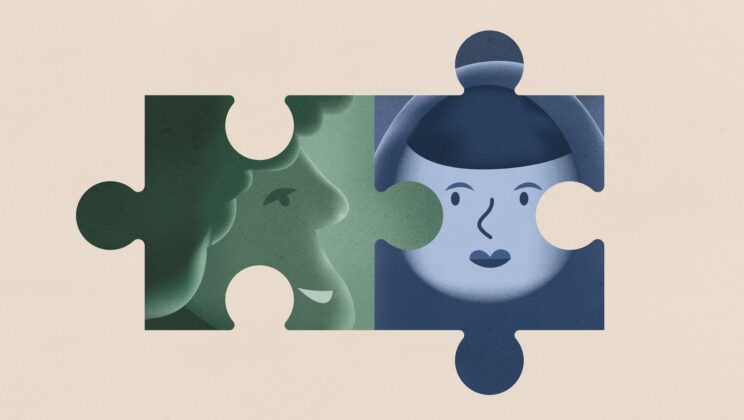How Grief Counseling Helps You Heal
April 1, 2024
We all experience loss in life. Grief counseling offers a safe space to navigate tough emotions, learn coping skills, and find a way to move forward with meaning and strength after loss.
What is grief counseling?
The Centers for Disease Control and Prevention defines grief as an emotional response to death and other losses that cause profound emotional reactions. Grief counseling can help you cope with death, a relationship’s end, job loss, limitations from an illness or injury, pregnancy loss, fertility challenges, or lifestyle changes that can come with parenthood. Also known as bereavement counseling or bereavement therapy, this type of care can help people of all ages.
Is grief counseling different from therapy? Grief counseling supports the grieving process after a loss whereas psychotherapy covers a broader range of mental health concerns. “Anger, sadness, and depression are all normal responses to grief,” said Becki Willis, a licensed professional counselor and Lyra Care Health therapist. “It's the response to loss that we're feeling in the moment. Grief is the response, and mourning is the outward expression of grief.”
Types of grief
While there’s no timeline or “normal” way to grieve, some people may need specialized help because of severe or long-lasting symptoms. Research estimates that 6-20% of adults who experience a loss will develop complicated grief symptoms.
Here are a couple possible diagnoses for ongoing grief that impacts daily life:
Prolonged grief disorder
Prolonged grief disorder includes persistent and severe grief lasting over 12 months after a loved one's death.
- Symptoms include intense yearning, preoccupation with the deceased, feelings of emptiness, and difficulty accepting the loss.
- Significantly impairs daily functioning.
Major depressive disorder (MDD)
Major depressive disorder (MDD) may be diagnosed if depression symptoms last longer than typical grieving periods.
- While grief and depression share similarities, MDD involves pervasive low mood, diminished interest or pleasure, changes in appetite or sleep patterns, and feelings of worthlessness or guilt.
- Goes beyond common grieving experiences.
Grief counseling techniques
Grief and loss counseling can teach you tools to cope with intense emotions. “The thing about grief is you can’t go around it, you can’t go under it, you can’t go over it. You must go through it, and that's the hardest part,” said Willis. “Emotion has the word ‘motion’ in it. We must move through our emotions, and grief counseling can help you do that.”
Here are some common grief counseling techniques:
Cognitive behavioral therapy (CBT)
CBT teaches us to name and recognize what we're feeling in order to break habits and become more resilient. In grief counseling, it helps us learn to better cope with thoughts and emotions around loss.
Mindfulness
Mindfulness is a way to focus attention on the present moment while becoming aware of thoughts and feelings without judgment. This provides space for emotions to pass through without getting stuck. “Mindfulness supports self-compassion by just allowing the emotions to come as they are and not judge them or over-identify with them,” said Willis. “It's a balance of, ‘I see you sadness, and I welcome you, but don't unpack your bags.’”
Acceptance and commitment therapy (ACT)
ACT is a mindfulness-based therapy that encourages you to accept thoughts and feelings while committing to actions aligned with your values. “ACT can help you stay focused on your values and goals, which can help you move through grief,” said Willis. “For example, if you’re grieving job loss and courage is one of your values, you can draw on that to find the courage to put yourself out there and apply for jobs.”
Group therapy
Group therapy in grief counseling helps you feel supported and validated by sharing experiences, emotions, and coping strategies with others who are going through loss.
Benefits of grief counseling
Grief and loss counseling can feel empowering by providing tools to reclaim happiness, peace, and the ability to navigate each day during loss. Here are some benefits of bereavement counseling:
Long-term resilience
Research shows people who took part in grief counseling after the loss of a partner or close relative reported fewer grief symptoms over time than those who didn’t.
Safe space
Bereavement counseling provides a safe, non-judgmental space to express emotions freely, and feel heard and validated. “Grief counseling lets someone else hold your pain for a little bit so you don’t have to,” said Willis.
Coping skills
A bereavement counselor teaches you coping skills as you mourn a loss, such as journaling exercises to process grief, deep-breathing exercises, and achievable daily goals.
Acceptance
Grief and bereavement therapy helps you accept a loss by gently encouraging you to embrace the reality of change.
Purpose
Bereavement therapy can help you find or rediscover a sense of meaning and purpose by channeling grief into ways to honor your loved one's memory. "Grieving the loss of my husband with the help of therapy inspired me to become a counselor where I honor him by helping others navigate their grief,” said Willis. “Life doesn't have to stop with loss; it can continue with newfound meaning and resilience."
Support system
Grief therapy can help you build a support system by pointing you to valuable resources like group therapy, support groups, and community resources that extend support beyond one-on-one therapy.
Online options
Some people may not attend grief therapy because depression depletes their energy and motivation to visit an office. Others might not have time to travel to and from appointments. Online grief counseling — offered by Lyra Health —can help break down these barriers.
What to expect in grief counseling
Your first grief therapy appointment sets the foundation for your counseling journey. You’ll tell your therapist why you’re there and share your loss story. The counselor will guide and support you in finding the words to express yourself. Your bereavement counselor will listen, ask questions, validate your experience, and provide a compassionate space for vulnerability.
"Clients have told me they worry about not knowing what to say and what to expect. My goal in grief counseling is to help you tell your story, feel validated in that story, and know that you don't have to stay stuck in it,” said Willis. "Many people just want someone to hear and hold their pain.”
Over several sessions, you’ll navigate loss and gain tools and coping strategies to move through grief. Grief may resurface intermittently, but you’ll learn how to manage those moments and integrate them into a changed but meaningful life.
Coping with grief in the workplace
Grief can impact every aspect of life, including work. The emotional impact of loss may affect concentration, productivity, and overall well-being. Here are a few tips to cope with grief in the workplace during this difficult time:
- Acknowledge the effects of grief on your professional life.
- Communicate your needs and challenges to your supervisor or HR department. This may involve discussing flexible work arrangements, adjusting deadlines, or temporarily reducing workload.
- If you’re comfortable, share your feelings with trusted co-workers. Colleagues can offer understanding and emotional support. Simply knowing that others are aware of your situation can create a more compassionate environment.
- Explore resources your employer offers like mental health benefits for grief and loss counseling.
- Set realistic expectations for yourself. Grieving is a personal and ongoing process, and it's important to acknowledge that productivity and focus may fluctuate. Establish realistic goals and communicate boundaries and needs.
- Prioritize self-care like taking breaks, allowing moments of reflection, and seeking additional support outside of the workplace.
Take steps toward healing
Whether it's the death of a loved one, the end of a relationship, or other significant life change, loss can be painful. Grief therapy can provide healing and a renewed sense of self. “Grief counseling can help you find or rediscover meaning and come to know that life doesn’t need to stop here,” said Willis. “It can continue, and that’s a good thing.”
Heal through grief counseling.
You can get started today if your employer offers Lyra.
Author
The Lyra Team
The Lyra Team is made up of clinicians, writers, and experts who are passionate about mental health and workplace well-being. With backgrounds in clinical psychology, journalism, content strategy, and product marketing, we create research-backed content to help individuals and organizations improve workforce mental health.
Reviewer
Becki Willis, LPC, PMH-C
Becki is a licensed professional counselor. She holds a master’s degree in rehabilitation counseling from the University of North Texas and a certificate in perinatal mental health. Her specialties include working with clients that have experienced grief, trauma, perinatal mental health, ADHD, and anxiety disorders.
Explore additional blogs

Mental health treatment
Should I Go to Therapy? How to Know if It’s Right for You

Mental health treatment
What Kind of Therapist Do I Need?

Mental health treatment